Legacy
MISSION HOLLOW MEMORIES
By Karl Priest
(Following are drafts submitted to Goldenseal magazine http://www.wvculture.org/goldenseal/summer09/index.html which, with minor editing, were published in the Summer 2009 edition.)
“I’ve got a mansion just over the hilltop” sang the group of children sitting on the hillside in Charleston. Just behind them was what many of them considered a mansion. They were residents of the Union Mission Children’s Home on Mission Road. They were my summer brothers and sisters.
The Union Mission Children’s home was part of a rescue ministry founded by former bartender and self-described drunkard turned preacher Pat Withrow (see Goldenseal July-September 1980 Soap, Soup, and Salvation). Brother Pat, as he was known to rich and poor, had a soft-spot for the down trodden –the drunkards, the unwed mothers, and especially the children who were abused or abandoned.
Pat Withrow’s mother died when Pat was ten years old. His father had to send the Withrow children to different homes. Being separated from his brothers broke Pat’s heart and he was so immensely impacted that he started the children’s ministry which was uncommon for a rescue mission. Brother Pat’s goal was to keep family siblings together.
The Abney family donated 840 acres to the Union Mission. The wooded land lay along South Park road near the Kanawha City section of Charleston and “Mission Hollow” began to materialize less than five miles from downtown. By 1931 there were summer dormitories, a swimming pool, playground, tabernacle, and vegetable garden located at the summer camp.
My father was one of those rescued by the mission and after he attained sobriety he served as a driver for Pat Withrow on some of his evangelistic campaigns. He met my mother at the Mission, they married in 1940, and I came along eight years later. We lived at the main Mission across from the current Charleston Civic Center and Town Center Mall complex until about 1950 and then moved to a small house located on the summer camp property. My father worked full time at the Thomas-Field wholesale company and was designated as the off-season caretaker for the Mission summer camp.
There was a family with five children living just on the upper edge of the Mission property that had two older daughters who were my surrogate big sisters. They would walk with me the mile or so up the hollow to South Park Elementary school. One morning we started out and had to return to their house when (our parents said it was the “tail-end” of a hurricane) a fierce storm hit. I had to tightly hold my lunch box in an arm fully extended by the wind and hold on to the hand of one of the neighbor girls while we struggled up the muddy path to their house.
A vast wooded area surrounded the Summer Camp, but I was too young to venture very far into it. Instead, I had a huge play area on the camp grounds. I had a friend further up the hollow who would ride his bicycle to play. I learned to ride a bicycle on his small one. My frugal and practical parents bought me a huge bicycle (using the Thomas-Field employee discount) that I “could grow into”. In order to get on and off of that huge bicycle I had to use two eight inch cinder blocks stacked together. That made for some precise calculations when I had to stop.
I never lacked for someone to play with when the Mission children came to stay during the summer. It was with those kids that I held a baseball bat in my first ball game one summer day. Watt Powell Park was about a mile below our house. My father took me to see the Charleston Senators play in the AAA American Association and baseball fever began to to catch hold of me. We always had to walk to the game and back, but thought nothing of it since we walked out of the holler to catch a city bus any time we had to go to town.
We enjoyed the nearly ice cold water of the camp swimming pool which was located along a creek at the base of the hill across the road from the main campus. Water for the pool came from the creek. During the day (before I graduated to a bicycle) I could ride my tricycle away from traffic in the open air tabernacle. Also, in the summer I could play in the no longer used chicken houses behind my home. I thought the trap doors (probably once used for cleaning purposes) were really neat.
My parents raised a garden along the creek bank across from our house and I would play in the creek while they worked in the garden. We must have had a chicken or two of our own because I remember my mother slinging the head off of one which, when released, ran around the yard headless.
During a winter snow, Mission Hollow kids would gather at the Well House which was an unwalled structure on the hill above the tabernacle. The older kids would light a fire and every one would sled down the hill toward the road. Once, I had finished sledding and was walking home. Just as I crossed a short bridge, located on a sharp curve, a car could not make the turn, rolled on to it’s right side and slammed the roof against the concrete and stone bridge abutment. Soon, a door was opened and some Charleston High School majorettes were helped out and down from the wreck.
Pat Withrow died in November of 1957. In September of 1956 he had recruited and relinquished to Memphis businessman/evangelist Clyde Murdock the management of the Mission ministries. Mr. Murdock began to greatly upgrade and expand the Mission ministry. A major part Murdock’s strategy was to make the summer camp a year round facility for the Mission children.
Renovations of the Abney Park (often called “ Camp Abney”) summer camp began during the winter of 1956-1957. My family had to move in the Spring of 1957. The “Mission Men” used a Mission truck to move us to public housing at Orchard Manor (see Goldenseal Summer 2006 Over the Hill is Out-Baseball in the Projects). We had to leave before school was out and I remember that my parents were not pleased, but Mr. Murdock had a plan in mind that made our move necessary.
The house I lived in became what was known as the “Tot House” for the younger children.
I remember that we had to leave our dog, which broke my heart, but I seldom returned to the area until I was in my early twenties. In December of 1971 I graduated from college and, while working part-time at the Belle Post Office and waiting on a permanent teaching position, I became a relief house parent in the boy’s dormitory at Brookside.
I lived in a room in the dormitory and when not on duty I performed various duties such as taking kids to doctor appointments and picking up food donations from a local bakery. On the campus I spent time playing ball with the boys on the diamond and in the gymnasium. At night we would watch television together. Overall, I was a more of a big-brother than a father figure.
The majority of former Brookside residents became good and productive citizens. After I got married in October of 1972 my wife and I would take some of the kids over to our house for visits. One boy called me regularly for several years and kept me posted on many of the others as they grew up, married, and had children of their own.
For many years the Union Mission children's ministry opened its loving arms to hurting children. Many of the children were hungry for food, but they all hungered and thirsted for love. They found a filling of love in a mansion just below the hilltop.
------------------------------------------
“They Were So Good to Me” Recalling Life at Brookside
by Karl Priest
Dewain Haynes spent 11 years at Brookside. He arrived as an infant with the (aunt given) nickname of “Porky” because he weighed 13 pounds as a baby. An alcoholic father made it impossible for the Sissonville family to remain as a unit, so most of the children were taken in by Brookside.
Dewain’s stay at Brookside was interrupted by stays in three different foster homes with 1 or 2 of his 12 brothers and sisters (7 boys and 6 girls). He returned to Brookside as a 7th grader and remained there until he graduated from Charleston High in 1976.
Brookside is remembered as a “fantastic” place by Dewain. He especially remembers a house-parent, the late Danny Fisher, who practically made Dewain a member of his family including taking Dewain on family vacations. Upon high school graduation Danny took Dewain and three other graduates to Camden Park only to find the park closed. They decided to attend an all-night drive-in theater and Danny neglected to inform his wife. The State Police found them eating breakfast in a Kanawha City restaurant the next day.
Dewain recalls that there was always something to do at Brookside—swimming, sports, and much more. The dorm had a TV room with a pool table. There were trips to many places including Hawk’s Nest, Camden Park, King’s Island, camping at Watoga State Park, and a good-will work trip to a Michigan farm with a side visit to Chicago. They frequently attended Civic Center events such as the circus, basketball games, and practically any other event held there.
When he first arrived at Brookside, the children traveled on an old school bus with “Union Mission Children’s Home” on the side, but in later years each group of children (by age) had a designated van.
On Sunday mornings they had to attend church on campus or could leave to attend a church of their choice. Many of them went to an off-campus service on Sunday evening. There were optional religious activities (Bible study or special speakers) sometimes during the week.
The children all had assigned chores. The senior boys each had a section of grass to keep mowed and they made sure the job was complete before leaving for week-end visits with relatives. Additionally, in the dorm, they were assigned cleaning chores which rotated weekly.
Naturally the children got into mischief and originally were paddled, but in later years the punishment was restriction to the dorm or the bedroom. Restriction meant that their meals were brought to them. Dewain remembers all of the staff (including non- supervisory such as cooks) were nice to them.
The food was “decent” and served in a cafeteria style.
They received a weekly allowance (Dewain’s last amount was $3).
The only bad memory Dewain has was of Christmas. They were given $35 to spend by ordering from a J. C. Penny catalogue. All that would buy was one or two small gifts. Church groups would provide them with edible treats, but that season was not as cheerful as it would have been had they lived in a normal family. Dewain does fondly remembers their Capitol Street bell ringing for the Salvation Army.
The dormitory conditions improved over the years. Originally there were four bunk beds and eight boys per room. During Dewain’s last few years, there were two boys per room and they had a counter-top desk under a wall mounted storage cabinet. They were allowed to have a radio or other form of electronic entertainment. The house parents would keep the boys’ perishable snacks in the house parent refrigerator.
During his high school years Dewain worked as a Western Union bicycle delivery boy and later he worked evenings in the laundry at St Francis Hospital. He rode a city bus back to Brookside after work. During the summers, the Manpower program provided Dewain with employment.
Upon graduation Dewain did construction work for a couple of years before landing a job running deliveries for the Dental Arts Company. Dewain became good friends with the owner, the late Bill Chevalier, and Bill provided technical training after work hours. After ten years Bill sold out and the new owners laid off Dewain.
Dewain worked as a janitor at Yeager airport until Bill decided he didn’t like retirement and, with Dewain as an equal partner, opened Statewide Dental Lab in Bill’s basement. After Bill’s health declined they sold their equipment to another dental lab and Dewain decided to reopen Statewide Dental using old equipment and working from his home. Soon, the business was going so well that Dewain (about 2001) rented 6 rooms in the Medical Arts Building where the business is currently located.
Now Dewain has a comfortable home in St. Albans and grand-children who like to visit his camp near Sutton Lake in Braxton County.
“If I had to live life over I wouldn’t mind going back (to Brookside) because they were so good to me.”
The following photographs appeared in the Goldenseal article.
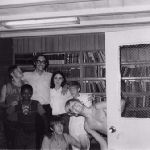
1972 visit with new bride
(Dewain gives me "ears")
|
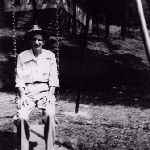
Dad |
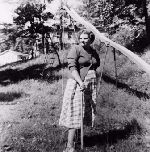
Mom |
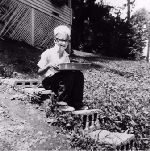
me
|
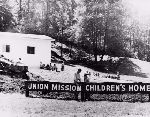
new construction |
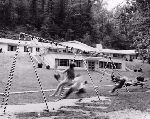
completed construction |
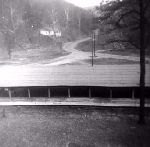
tabernacle
(my house in background) |
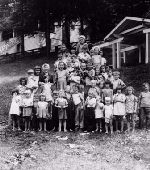
My "brothers" and "sisters" |
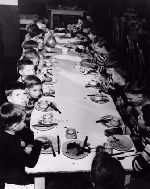
winter home for the kids |
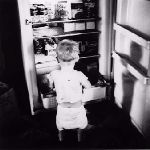
unidentified |
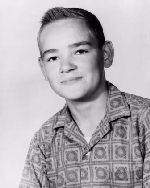
Dewain (young) |
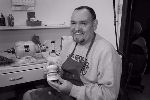
Dewain ("old") |
Also see Union Mission.
LEGACY INDEX
|

